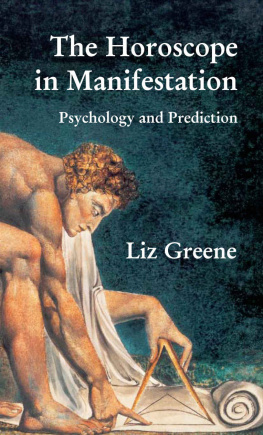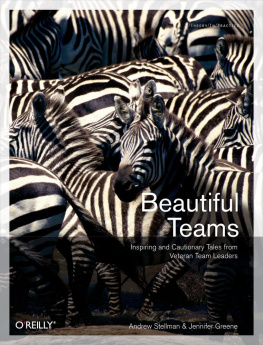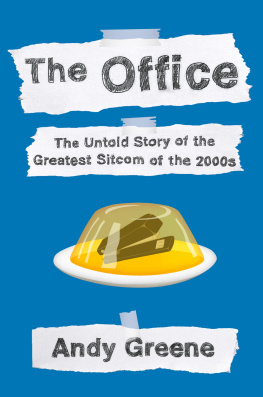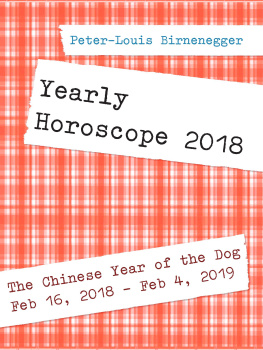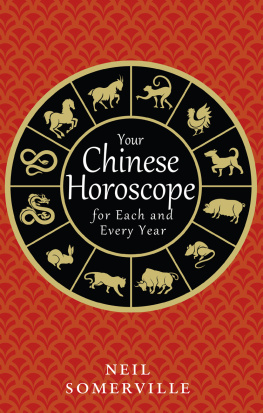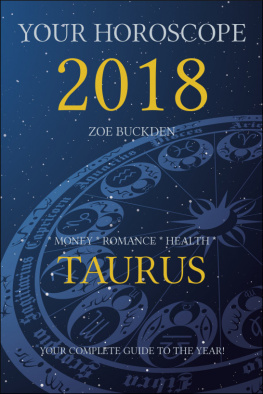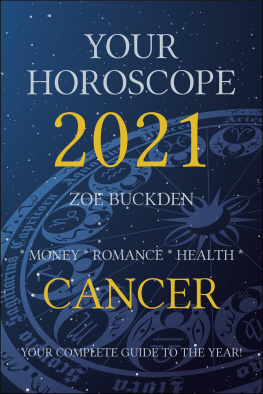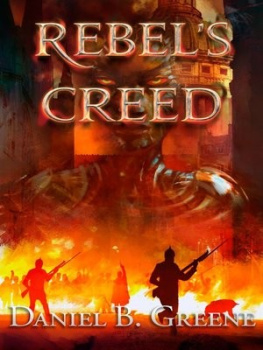Greene - The Horoscope in Manifestation
Here you can read online Greene - The Horoscope in Manifestation full text of the book (entire story) in english for free. Download pdf and epub, get meaning, cover and reviews about this ebook. year: 2014, publisher: CPA Press, genre: Religion. Description of the work, (preface) as well as reviews are available. Best literature library LitArk.com created for fans of good reading and offers a wide selection of genres:
Romance novel
Science fiction
Adventure
Detective
Science
History
Home and family
Prose
Art
Politics
Computer
Non-fiction
Religion
Business
Children
Humor
Choose a favorite category and find really read worthwhile books. Enjoy immersion in the world of imagination, feel the emotions of the characters or learn something new for yourself, make an fascinating discovery.
The Horoscope in Manifestation: summary, description and annotation
We offer to read an annotation, description, summary or preface (depends on what the author of the book "The Horoscope in Manifestation" wrote himself). If you haven't found the necessary information about the book — write in the comments, we will try to find it.
Greene: author's other books
Who wrote The Horoscope in Manifestation? Find out the surname, the name of the author of the book and a list of all author's works by series.
The Horoscope in Manifestation — read online for free the complete book (whole text) full work
Below is the text of the book, divided by pages. System saving the place of the last page read, allows you to conveniently read the book "The Horoscope in Manifestation" online for free, without having to search again every time where you left off. Put a bookmark, and you can go to the page where you finished reading at any time.
Font size:
Interval:
Bookmark:
CPA Seminar Series
The Horoscope
in Manifestation
Psychology and Prediction
Liz Greene
CPA
Centre for Psychological Astrology Press
London
First published 1997 by The Centre for Psychological Astrology Press
This Kindle Edition published 2014 by CPA Press
THE HOROSCOPE IN MANIFESTATION: PSYCHOLOGY AND PREDICTION
Copyright 1997 by Liz Greene.
Liz Greene asserts the moral right to be identified as the author of this work.
All rights reserved. No part of this book may be reproduced or transmitted in any form or by any means, electronic or mechanical, including photocopying, recording, or by any information storage and retrieval system, without permission in writing from the publisher.
Table of Contents
Part One: Complexes and Projection
This seminar was given on 25 May, 1996 at Regents College, London, as part of the Summer Term of the seminar programme of the Centre for Psychological Astrology.
The subject of complexes is, if you will excuse the expression, highly complex. But it is immensely valuable as a psychological model, because it can give us remarkable insight into the dynamics of a horoscope. Of all the many available psychological perspectives, that of complexes is one of the most useful to the astrologer, and one of the most profound. We can view complexes reductively to understand personal conflicts and family dynamics more clearly. Or we can view complexes from an archetypal or mythic perspective, and get a glimpse of the deeper meaning behind a persons experiences and development pattern. Both views are valid. What we are really looking at is a psychological model of fate.
Although the term complex is relatively modern, awareness of its dynamics is very ancient. Greek myth, with its vivid portrayals of the family curse and the compulsions visited upon humans by gods, gives us our earliest models of how a complex operates. The Greeks understood that something some compulsive inner pattern which created dramatic repercussions in outer life had an irrevocable way of passing from father to son, from mother to daughter, and this something was usually linked with one or another of the gods. Not only family curses, but also family gifts could be inherited in this way. What is most psychologically relevant about these mythic portrayals is the compulsive nature of this something which drives human beings into beliefs, actions and feelings over which they have no conscious control and which are often in violent opposition to their ethics and values.
By presenting these compulsive patterns as the signature of a dynamic relationship between human and god, myth highlights the numinous nature of complexes. To the Greeks, the enactment of an inherited pattern was fate in the most profound sense. When Orestes killed his mother to avenge his fathers death, he was compulsively acting out yet another of a long line of offences against deity which began with his ancestor Tantalos and ended only when his efforts to find an alternative solution created a new relationship between the gods themselves. The Greeks also seem to have understood that, although complexes are fate, human intervention can alter their expression, if not their essential divine core. In modern dynamic psychiatry, complexes were initially explored almost solely in terms of pathology. But the mythic portrayal of their workings gives us an entirely different perspective. Complexes are not only fate they are the primary factor in both human and divine evolution.
We can trace the history of the complex in modern psychology back to Charcot at the end of the 19 th century. In his work with hysterical patients at the Salptrire in Paris, he came to the conclusion that behind particular kinds of mental disease lay pockets of associated ideas at work in the unconscious. These were in some way disconnected from consciousness and had a life of their own. Rather than trying to paraphrase him, I will read you a quote from Charcot, given in a lecture on hysterical paralysis in May 1885, which puts this first formulation of the complex quite clearly:
...an idea, a coherent group of associated ideas settle themselves in the mind in the fashion of parasites, remaining isolated from the rest of the mind and expressing themselves outwardly through corresponding motor phenomena...The group of suggested ideas finds itself isolated and cut off from the control of that large collection of personal ideas accumulated and organised from a long time, which constitutes consciousness proper, that is the Ego.
Charcot believed that split-off fragments of the personality can follow an invisible development of their own, accrue enormous power, and eventually express themselves through clinical disturbances which thwart the egos wishes and goals. Although it may seem a long way away from the Greek gods, possession by a deity and the repercussions of the family curse are different ways of describing the same phenomenon. Something other than conscious volition is master in the psyches house.
Pierre Janet took Charcots idea and developed it further. He coined the term ide fixe subconsciente to describe these split-off personality fragments which seemed to wield such power. A quote from Janet is also in order here, to give you a flavour of how these early psychological pioneers perceived the workings of the psyche.
...The idea, like a virus, develops in a corner of the personality inaccessible to the subject, works subconsciously, and brings about all disorders of hysteria and of mental disease.
Janet had enormous influence on modern psychology and psychiatry, and as we shall see in a moment, what Jung called the complex was originally simply the equivalent of Janets subconscious fixed idea. In these early days, the complex was viewed solely as a facet of pathology, and the split-off fragments were understood to be repressed conflicts primarily sexual which the ego could not face or deal with. During the course of the day we will see that this view of the complex is still relevant in specific individual situations, since personal conflicts flesh out the bones of the complex and may need to be dealt with as a source of pathology. But the core of the complex is not pathological.
The next important researcher into complexes was Freud. Although he rarely named the sources for his ideas, he did acknowledge Janets priority, both in the discovery of subconscious fixed ideas and in the cure of the patient through catharsis and conscious awareness of the troublesome ide fixe. The essential techniques of psychoanalysis dream interpretation and free association are ultimately geared toward raising the complex into consciousness. Freud, like Charcot and Janet, initially viewed the complex as essentially comprised of repressed personal memories and conflicts. Only later did he begin to acknowledge complexes as universal factors which provided the motivating force in every individuals development.
Jung, while still Freuds disciple, introduced the term complex into psychoanalytic thought. The Oedipus complex might otherwise have been called the Oedipal fixed idea the inevitable and universal incestuous triangle of childhood, with all its attendant desire, fear, guilt, aggression and shame. Likewise, Alfred Adler took up Jungs term and utilised it in his concept of the inferiority complex the fixed idea of inferiority at work beneath the threshold of awareness, which leads to a compulsive power-drive that can both achieve greatness and destroy the individual.
At the turn of the century, while working at the Burghlzli Clinic, Jung developed the famous word association test to demonstrate the existence and nature of unconscious complexes. The test had been around for a while in crude form, but Jung restructured and refined it. At this time Jung was still a Freudian, if that is the right way of putting it. For any of you who might be unfamiliar with this test, it consists of reading a succession of carefully chosen words to the subject, who has to respond with the first word that occurs to him or her. The reaction time is measured precisely, and anomalies, such as a delayed response, no response, a stutter or mispronunciation, or the repetition of one word over and over again, are carefully noted. Then the connections between the responses are examined.
Next pageFont size:
Interval:
Bookmark:
Similar books «The Horoscope in Manifestation»
Look at similar books to The Horoscope in Manifestation. We have selected literature similar in name and meaning in the hope of providing readers with more options to find new, interesting, not yet read works.
Discussion, reviews of the book The Horoscope in Manifestation and just readers' own opinions. Leave your comments, write what you think about the work, its meaning or the main characters. Specify what exactly you liked and what you didn't like, and why you think so.

